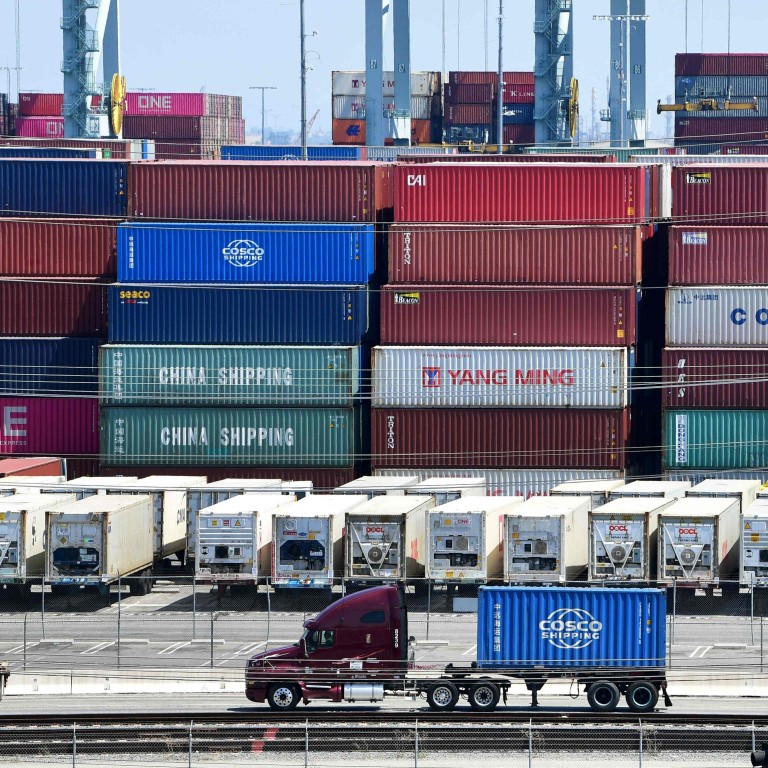
Trade war, intellectual property theft among top risk worries for companies in China, Kroll report finds
- Ninety-four per cent of companies in China see IP theft as their top risk priority, Kroll says
- Adversarial social media activity a rising risk in China, survey finds
Geopolitical concerns including the trade war and intellectual property theft are some of the biggest risks for corporate executives operating in China, at both domestic and multinational companies, according to a new report by corporate investigations and risk consultancy Kroll.
More than three quarters of companies operating in China said in Kroll’s annual Global Fraud and Risk Report that they were affected by the trade war that has raged for more than a year between Washington and Beijing, including the tariffs put in place by both countries. By comparison, just over half of executives surveyed globally said their companies were affected by the trade war.
Executives in China also cited restrictions on foreign investment and changes in economic treaties as major geopolitical risks that have affected their companies in the past year. About 85 per cent of Chinese companies prioritised mitigating the risk of disruption due to sanctions, tariffs and trade agreements – much more widely than do enterprises in any other country, Kroll said.
“The [Sino-US ] relationship over the past few decades has been quite positive. That has shifted to almost uncharted territory with the ongoing trade war,” said Violet Ho, Kroll’s head of Greater China. “We have not really seen companies coming up with very meaningful solutions on this – other than that they’re aware of it and they’re trying to address it on an ongoing, tactical basis. I think in the bigger picture of where this is going, that remains a concern, rather than a foregone conclusion.”
Forrester Consulting, on Kroll’s behalf, surveyed 588 senior executives who are responsible for risk management at their firms between March and April. Respondents came from 13 countries and 10 industries, with 92 per cent of the organisations operating in more than one country.
US President Donald Trump has put tariffs on about US$380 billion of Chinese-made goods in the past year as he tries to change decades of trade and industrial policy in China.
Hong Kong’s richest saw 9 per cent drop in their wealth last year
The disruption caused by the trade tensions has cut into global trade, forced companies to rethink their supply chains and weighed on future business investment, with S&P Global Ratings saying this week that “business confidence is eroding in all the major economies” in Asia.
The US and China are expected to resume discussions next week, with Chinese Vice-Premier Liu He due to travel to Washington for the talks.
“Our view remains that the Chinese leadership has accepted the need for slower growth. Furthermore, the trade war provides a useful scapegoat for an economic slowdown that to some degree was inevitable,” said Jon Harrison, managing director for emerging markets macro strategy at TS Lombard. “It may be that some limited interim deal on trade is possible, but this will require compromise on the part of the US that will prove difficult for the administration to sell domestically. At the same time China is unlikely to compromise its red lines. Hopes of any deal at all, even of an interim nature relating only to trade, may prove illusory.”
At the same time, companies in China are putting a greater emphasis on intellectual property protection than they have in the past.
Intellectual property protections and forced sharing of technology have been a key focus for the Trump administration in its disagreement with Beijing.
Domestic Chinese companies, however, are becoming more concerned about protecting their own products and technology as well, Ho said.
‘New red scare’ shrouds US-China tech war as Trump cracks down on IP theft
Among executives globally, China had the highest percentage of respondents who said their companies had experienced intellectual property theft in the past year – 48 per cent versus 24 per cent elsewhere. According to the report, 39 per cent of executives said that their companies in China have experienced data theft in the past year.
As a result, 94 per cent of companies surveyed in China said that combating intellectual property theft was their top priority, with 88 per cent focused on leaks of internal information, according to the report.
“In the past, a lot of Chinese companies did not consider IP to be an issue that’s relevant to them,” Ho said. “Honestly, they did not have much IP to protect in their own right. That has actually changed over the past decade or so.
“A lot of Chinese companies have also invested substantial capital resources into developing their own IP. There’s a shift in attitude toward IP protection.”
Companies in China also reported adversarial social media activity as a rising risk, with 39 per cent of executives saying their firms had experienced it in the past year. That is much higher than the 27 per cent globally, according to Kroll.
“It’s relevant to how plugged in the Chinese population is, especially among the younger generation,” Ho said. “Good news travels, but bad news travels even faster. ”

